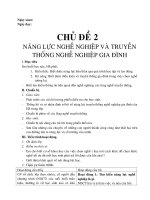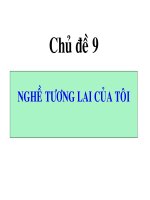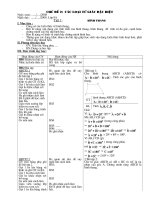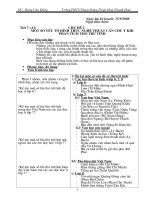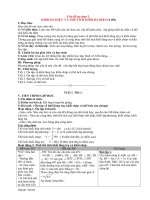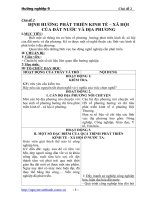chu de 2 lop 9
Bạn đang xem bản rút gọn của tài liệu. Xem và tải ngay bản đầy đủ của tài liệu tại đây (71.34 KB, 4 trang )
<span class='text_page_counter'>(1)</span><div class='page_container' data-page=1>
<b>EDUCATION</b>
<b>A. Language Focus </b>Circle the best answer A, B, C or D to complete each of thefollowing sentences.
1. He asked me _______.
A. what my name is B. what was my name
C. what my name was D. what is my name
2. She wanted to know _______ the youngest child in my family.
A. if I was B. if I were C. if was I D. if were I
3. My mother _______ she would come home late tonight.
A. said me B. told me C. asked me D. told to me
4. If you want to lose weight, you _______ eat more vegetables and do
more exercise.
A. should B. might C. must D. have to
5. If you want to send your son to Australia to study in 4 years, you
_______ prepare a lot of money for him.
A. will B. would C. are sure D. should
6. My father asked me why _______.
A. did you come home late B. did I come home late
C. I came home late D. I come home late
7. We have English lessons _______ Monday, Wednesday and Friday.
A. on B. in C. at D. to
8. We often have a lot of extra activities on Saturdays and Sundays
_______ school to help with the school environment.
A. on B. in C. at D. to
9. My English teacher told me that I should _______ if I wanted to improve my listening skill.
A. watch cable TV B. read English short stories
C. talk to my classmate in English D. write diary in English
10. Playing English games always makes us _______.
A. liked B. excited C. enjoyed D. interested
Each of the following sentences has 4 underlined parts (A, B, C and D). One of these parts contains an error.
For each sentence, choose the part that contains the error.
11. John told me he is going to visit his mother that day.
A B C D
12. “I may have some houseguests the following day” Jim said to me.
A B C D
13. Nancy said she had visited Paul in the hospital yesterday.
A B C D
14. Ben said he had invited Sarah to the party but she refuses.
A B C D
15. Jane said she was going fishing with her friends and asked it we wanted to join.
A B C D
16. If you want to learn English vocabulary well, you need to take a vocabulary notebook.
A B C D
17. Have an English pen pal is a good way to learn writing skill.
A B C D
18. When I was small, I used to learn new English words by write them on small pieces of paper.
A B C D
19. Living in an English-spoken country like England can help to improve your English very fast.
A B C D
20. Many of my friends said that they would learn more than one languages in the future.
A B C D
<b>B. Reading</b>: Students will be able to read a passage of 150 – 180 words for general or specific information.
<b>I. Read the passage and decide if the statements are true (T) or false (F).</b>
</div>
<span class='text_page_counter'>(2)</span><div class='page_container' data-page=2>
Youth For Understanding (YFU) was begun to improve understanding between the United States and
Germany after World War II. In 1951, 75 German teenagers were selected to live with American families
for one year. In 1955, the first American teenagers were placed with European families. Since 1951, YFU
has exchanged approximately 200,000 students from more than 50 countries. In the mid-fifties, the program
expanded rapidly in Europe, Asia, and the Pacific. YFU was introduced to Latin America in 1958,
beginning with Mexico. Although YFU was founded in the United States, it is truly international. For
example, a Brazilian student can go to the United States or to any of 12 countries, including Denmark,
Australia, and France. Exchange students are placed with families in their host countries. Host
families are carefully selected so that the visit is a safe and rewarding experience. Exchange students attend
school where they make friends and learn what life is like for teenagers in the host country. If a different
language is spoken in the host country, students will need to meet minimum language requirements.Students
also must demonstrate that they are committed to the host family and are ready for cross-culture living.
(Adapted from Style 2 – Student’s book)
1. The first German teenagers were placed with American families in 1951... ..
2. YFU came to Latin America in the 1950s of the 20th century. .. ..
3. Brazilian students can go to Denmark for an exchange program. .. ..
4. Making friends and learning about life in the host country are the main activities of exchange students... ..
5. It is not necessary for students to show their commitment to the host families... ..
<b>II. Read the passage and fill in each blank a phrase from the box below.</b>
A. the conversation B. so important C. through body language
D. and interest E. expressing
<b>Body Language – What does it say?</b>
More than half of what we communicate is communicated not through words but (1)_______. Because body
language is (2)_______, you’ll want to know what yours is saying and how to interpret other people’s too.
Here are some examples of body language and its meaning in North America. A smile is a sign of
friendliness and interest. But sometimes people smile just to be polite. To get another clue from people’s
faces, notice their eyes. Friendliness (3)_______ are expressed when a person’s eyes meet yours
(especially when you’re the one who’s talking) and then look away and meet yours again. A person who
doesn’t look away is expressing a challenge. A person who doesn’t look at you is (4)_______ lack of
interest or shy. Hand gestures can mean a person is interested in (5) _______. But repeated movements –
like tapping a pencil or tapping a foot – often mean the person is either impatient or nervous. Stay away
from someone who points at you while talking with you: That person might be angry at you or
feel superior to you.
<b> C. Listening</b>
I. Listen to the text and circle the best answer A, B or C to complete each of the following sentences.
1. There are _______ periods in the history of the English language.
A. two B. three C. four
2. English was first introduced to what is now _______ in the fifth century.
A. Great Britain B. France C. Germany
3. English was strongly influenced by French because of _______.
A. the technology B. the traveling C. the Normans
4. English changed very fast during _______.
A. the fifth century B. the 15th and 16th centuries C. the 19th and 20th centuries
5. During the 19th and 20th centuries, many new words were introduced because of _______.
A. the influence of Christianity B. the Norman invasion
C. contact with other languages and the technology
<b>II. Listen to the text and decide if the given statements are true (T) or false (F).</b>
1. Nowadays, there are 372 million people speak English in the world. .. ..
2. In 50 year’s time, there will be a change in the picture of most common languages in the world... ..
3. Chinese is the most popular language now. .. ..
4. The number of young people speaking English in the world will reduce in the future... ..
5. English will be more popular than Chinese in the future. .. ..
</div>
<span class='text_page_counter'>(3)</span><div class='page_container' data-page=3>
I. Students work in pairs to ask for and give information about a language course basing on the following
information. Sunflower Language School English Course for Teenagers
1. Time: 31/1/2012
Tuesday, Thursday, Saturday (5 p.m – 7 p.m)
2. Length of the course: 3 months
3. Level of the course: beginner
4. Opening day: 31 January 2010
5. Fee: USD 100 (books and CDs included)
II. Students talk about their own methods of study English in general by answering the following questions.
1. How do you improve your speaking skill?
2. How do you improve your listening skill?
3. How do you improve your writing skill?
4. How do you improve your reading skill?
5. How do you learn English grammar and vocabulary?
III. Students choose a particular language skill in English (speaking, listening, writing, reading) that they
like learning to talk about Suggested ideas:
1. The skill that students like learning most
2. The reasons why
3. Some learning methods that the students used to use in the past
4. The results
5. Some learning methods that the students are using
<b>E. Writing</b> Students will be able to write a letter of enquiry within 80 – 100 words following a model and
an outline given.
I. Look at the following advertisement. Write a letter of enquiry of about 80 – 100 words to the school
requesting for more information about the courses and fees.
<b>Brand New English Courses for Teens</b>
Be Confident: Confidently prove yourselves by favourite topics in music, sport, fashion and cultures, etc in
English Be Professional: Develop professional styles like foreign students, such as confidently giving
presentation, discussion and writing essays.Be Fluent: Raise your ideas and practise to quickly respond in
English. The unique training program will equip you with accurate pronunciation and natural intonation.
Follow the following outline:
1. Introduction: say how you know about the course (TV, newspaper, Internet …)
_______________________________________________
_______________________________________________
2. Interest: express your interest for the course
_______________________________________________
_______________________________________________
3. Request: ask for some information about the course (the fee, the timetable,… )
_______________________________________________
_______________________________________________
_______________________________________________
4. Contact information: give some contact information about you for the school to send you the information
requested (home address,telephone, e-mail …)
_______________________________________________
_______________________________________________
5. Closing remarks: End the letter with a polite closing.
_______________________________________________
_______________________________________________
II. You have registered for an English course at a language school. The course will start in one week’s time.
However, you are now busy preparing for your final examinations at your secondary school, and cannot
attend the first three weeks of the course. Write a letter of enquiry within 80 – 100 words, using the words
given below, to ask for canceling the course and attending another course later.
</div>
<span class='text_page_counter'>(4)</span><div class='page_container' data-page=4>
1. I / registered / English course for teens / your language school / April,
21st, 2012. The course / start / May, 20th, 2012 /.
_______________________________________________
2. However, / very busy / preparing / final examinations /my secondary school /.
_______________________________________________
_______________________________________________
3. I / writing / ask / if / cancel / the course / starting / May, 20th, 2012, / be / waiting list / later course /.
_______________________________________________
_______________________________________________
4. I / want / know / if / have to / pay / extra fee / the coming course / and the time / start /.
_______________________________________________
</div>
<!--links-->
